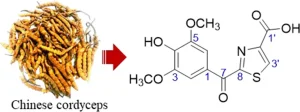
Cordyceps sinensis, a unique fungus native to the high-altitude regions of the Tibetan Plateau, has gained significant attention in recent years as a dietary supplement. This fascinating organism, known as “winter worm, summer grass” in traditional Chinese medicine, has been used for centuries to promote health and longevity. Today, it has found its way into the global market as a popular supplement, touted for its potential benefits in various aspects of human health.
The story of Cordyceps sinensis is as intriguing as its purported effects. In nature, the fungus infects caterpillars, eventually replacing the host’s tissue and sprouting a fruiting body from the insect’s head. This bizarre life cycle has contributed to its mystique and value in traditional medicine. However, due to its rarity and the challenges of harvesting wild Cordyceps, most supplements today contain cultivated Cordyceps, often grown on grains or in liquid cultures.
One of the primary reasons for Cordyceps’ popularity as a dietary supplement is its potential to enhance energy and stamina. Many users report increased vitality and reduced fatigue when taking Cordyceps regularly. This effect is thought to be related to the fungus’s ability to improve oxygen utilization in the body. Some studies suggest that Cordyceps may increase the production of adenosine triphosphate (ATP), the primary source of energy in our cells. This property has made Cordyceps particularly appealing to athletes and fitness enthusiasts looking to improve their endurance and performance.
Beyond its energy-boosting properties, Cordyceps is also valued for its potential immune-modulating effects. The fungus contains various bioactive compounds, including polysaccharides and cordycepin, which are believed to support immune function. Some research indicates that Cordyceps may help regulate the immune system, potentially benefiting those with both overactive and underactive immune responses. This dual action makes it an interesting subject for further study in the context of autoimmune disorders and immunodeficiency.
Cordyceps has also garnered attention for its possible anti-aging properties. Traditional use of the fungus for longevity has sparked scientific interest in its potential to combat oxidative stress and inflammation, two key factors in the aging process. Some studies have shown that Cordyceps may have antioxidant properties, helping to protect cells from damage caused by free radicals. Additionally, its anti-inflammatory effects could potentially contribute to overall health and longevity by reducing chronic low-grade inflammation associated with many age-related diseases.
In the realm of cardiovascular health, Cordyceps shows promise as well. Some research suggests that it may help lower blood pressure and improve cholesterol profiles. The fungus has been associated with increased production of nitric oxide, a compound that helps relax blood vessels, potentially leading to improved circulation. These effects, if confirmed by further research, could make Cordyceps an interesting supplement for those looking to support their heart health naturally.
Another area where Cordyceps has drawn interest is in liver and kidney function. In traditional medicine, the fungus has long been used to support these vital organs. Modern research is exploring its potential hepatoprotective effects, with some studies indicating that Cordyceps may help protect liver cells from damage and support overall liver function. Similarly, some research suggests that Cordyceps could have renoprotective properties, potentially benefiting those with kidney issues.
The potential benefits of Cordyceps extend to sexual health as well. In traditional use, it has been considered an aphrodisiac and a remedy for sexual dysfunction. Some modern studies have explored its effects on libido and sexual function, with mixed but promising results. While more research is needed, the potential for Cordyceps to support sexual health adds to its appeal as a multifaceted supplement.
Despite its long history of use and growing popularity, it’s important to note that much of the research on Cordyceps is still in its early stages. Many studies have been conducted in vitro or on animal models, and more robust human clinical trials are needed to confirm its effects and optimal dosages. Additionally, as with any supplement, individual responses can vary, and it’s always advisable to consult with a healthcare professional before adding Cordyceps to one’s regimen, especially for those with pre-existing health conditions or taking medications.
The safety profile of Cordyceps is generally considered good, with few reported side effects when taken as directed. However, as it may have blood-thinning properties, individuals on anticoagulant medications or those with bleeding disorders should exercise caution. Pregnant and breastfeeding women are often advised to avoid Cordyceps due to a lack of safety data in these populations.
In conclusion, Cordyceps sinensis represents an intriguing addition to the world of dietary supplements. Its potential to support energy, immune function, cardiovascular health, and overall well-being has captured the attention of both consumers and researchers. While more scientific investigation is needed to fully understand its mechanisms and confirm its benefits, the long history of traditional use and promising preliminary research make Cordyceps a supplement worth considering for those looking to support their health naturally. As research continues, we may gain a clearer understanding of how this unique fungus can be best utilized to promote health and vitality in the modern world.
Need your own dietary supplement manufacturer? Extremely competitive rates. We produce it all. Talk to us.
Comments are closed